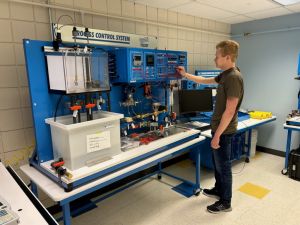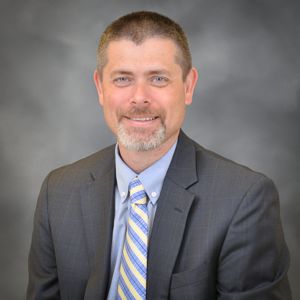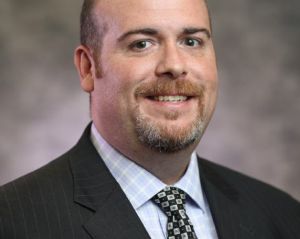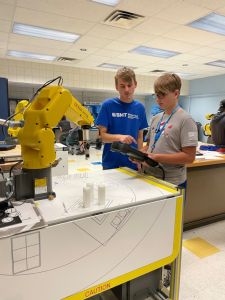Several years ago Marion Technical College in Ohio had an impediment in its pursuit of big federal grants that is unfortunately an all-too-common problem for rural two-year colleges. The college wanted to hire a full-time grant writer, but none of the applicants had experience with large, competitive grants. President Ryan McCall said he thought if he hired an inexperienced person, the individual would learn just enough on-the-job to springboard to a larger organization in a few years.
Around that time Ohio compelled the state’s rural two-year colleges to work collaboratively on a program with the larger, urban community colleges in their respective regions. That experience was so positive it prompted McCall to ask David Harrison, president of Columbus State Community College, if Marion Tech could contract with Columbus State’s grants office for help writing a U.S. Department of Education Title III grant. Marion Tech had been declined for funding three times despite assistance from an expensive consultant.

The fee-for services arrangement that began in 2018 now includes grants management due to Marion Tech’s $5 million in awards, including a Title III grant, two Advanced Technological Education grants, and a federal TRIO grant.
“I have access to the whole team for less than half of what it would cost me to hire a grant writer,” McCall said.
It’s an arrangement that Shane Kirby of Columbus State says other colleges could replicate, and that Columbus State has customized in response to requests from several other small, rural Ohio colleges.
“We have different levels of service that I think other colleges could provide or just take the model and find out what works for them,” Kirby said. He is the director of Advancement Partnerships at Columbus State, a mentor for the Pathways to Innovation ATE Grant Seeker Academy, and executive director of the Goldman Sachs 10,000 Small Businesses Program in Columbus.
Partnership Featured in Thought Leaders’ Dialogue Report
Kirby has also developed instructional modules about grant development for the Community College Presidents Initiative in STEM, an ATE project that raises awareness of the ATE program and builds institutional capacity for STEM initiatives.
CCPI-STEM’s recently released Thought Leaders Dialogue Report includes a sidebar about the partnership between Marion Tech and Columbus State, which are 50 miles from each other in Central Ohio. The virtual meeting was convened by CCPI-STEM and the League for Innovation in Community Colleges on May 11, 2023, to gather insights from community college leaders about how to catalyze engagement in STEM programs. CCPI-STEM’s next dialogue will be convened from 12 p.m. to 1:30 p.m. Eastern on February 09, 2024. It is open

The connections between Marion Tech and Columbus State that started nearly a decade ago with the state-initiated collaboration have been fortified by the trust between the two presidents and expanded into multiple collaborations between the faculty, administrators, and staff of both institutions.
McCall said, “In many ways we are benefiting from each other. There are grants that we would not have the opportunity to be part of, but that we can come alongside or be part of a grant that they are able to get and vice versa.”
For example Columbus State is a sub-awardee on the ATE grant that Marion Tech received in 2023 for its Incorporating Virtual Reality into Advanced Manufacturing Technician Education at a Rural Community College project. Marion Tech is also a sub-awardee on Columbus State grants.
Marion Tech received its first ATE grant in 2020 for Bridging the Skills Gap in Smart Manufacturing through a New Technician Education Program. This grant provided release time for faculty to develop curriculum that responds to regional industry needs; acquisition of process control trainers for students to learn how to operate and troubleshoot various devices used in manufacturing; professional development for high school teachers; and summer camps to encourage middle and high school students’ interest in smart manufacturing technologies.
Evolution of “Phenomenal” Partnership
In a separate interview, Kirby called the relationship between Marion Tech and Columbus State “phenomenal.” He explained that while working with Marion Tech’s faculty and staff, Columbus State’s personnel have learned too.
“It helps us develop partnerships with other colleges that are in the region. It helps us explore sometimes additional grants that maybe we would not have access to or programs that we don’t currently have ... The partnership has continued to benefit both of us, and allowed us to have a steady partner that now knows grants well, that can work on consortium proposals,” he said.
The funding from the fee-for-services arrangement has also fortified Columbus State’s grants office, which had 20 staff members at the time of the Kirby’s interview in summer 2023. Responsibilities for multiple grants are braided among team members who are grouped to focus on particular tasks such as grant applications, bookkeeping, and other post-award management.
“It took us 10 years to build all that up,” he said. In 2013 Kirby and a part-time secretary were the entire grants office staff at Columbus State.

Expansion of the grants office followed implementation of the college’s strategic plan that prioritizes student success, workforce development, and community impact. It was adopted after Harrison became president of Columbus State in 2010. Early in his career Harrison was the principal investigator of an advanced manufacturing center at Sinclair Community College that was one of the first ATE centers funded in 1994.
During a panel discussion at the 2022 ATE Principal Investigators’ Conference, Harrison said that experience taught him that it takes “venture capital” to keep current programs vital or to start new programs. Between 2014 and 2023 Columbus State faculty have been the principal investigators on 16 ATE grants, including a recent award of $7.45 million for the new National Information Technology Center.
“ATE has been a great source of the venture capital,” Harrison said in 2022, adding, “It has absolutely upgraded programs across the board. It has created opportunities for partnerships with industry that we didn’t have before and would not have had otherwise. It’s been a really important leadership development opportunity for faculty and others to understand what’s possible…It’s been really transformative for us at Columbus State.”
Advice for Getting Started with ATE
Kirby said it was necessary early on “to sell this to our faculty. And so having a team that helps them with this process is a big part of how we’ve been successful.”
He encourages college faculty who lack experience with grants to take advantage of the mentoring available from multiple ATE projects.
He also urges college administrators to set up systems that support faculty in their development of grant proposals and execution of funded initiatives.
“Having specialized support staff that can help let the faculty do the faculty work—and take the burden off some of the planning of events, and logistics, just all the other bureaucracy, and other aspects and logistics that go into the work— has really enabled our faculty to be successful and want to do these grants,” he said.

He also points out that it is possible to build on the strengths of a college’s personnel and to hire expertise where necessary as Marion Tech has done.
“You may not have a fully functioning grants office, but you will likely have people who do planning or project management in your organization who you can [enlist]. How can you leverage some of those skill sets?” he said.
The key question for college leaders is this: “For faculty members, how do you create re-assign time so you can expand that out?”

 Subscribe
Subscribe


 See More ATE Impacts
See More ATE Impacts

Comments
It is a good performance